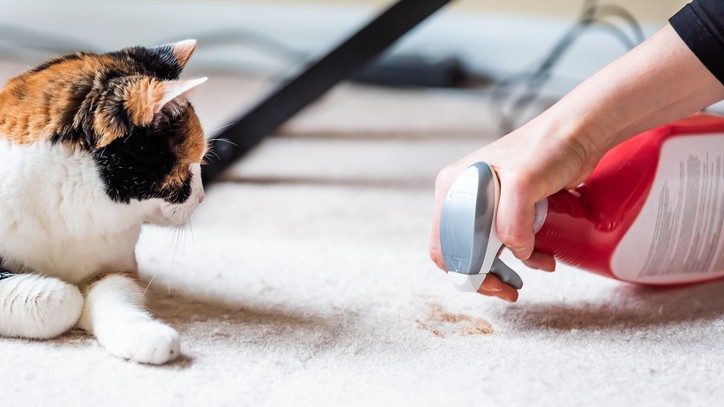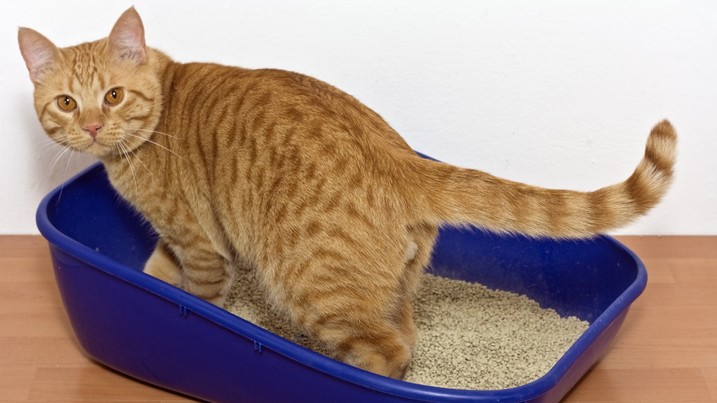How to stop a cat from pooping on the floor
Read our tips on how to stop a cat from pooping on the floor if you’re fed up of finding special treats from your feline friend outside the litter box

Knowing how to stop a cat from pooping on the floor is a must for those with feline friends. With cats, even if you have the best cat litter, you can still fall foul of your cat’s better judgement. Even those who keep on top of the litter box by signing up for the best cat litter subscriptions can still come a cropper.
Luckily, there’s plenty you can do to get your cat’s poop in the place it’s supposed to be. First things first – you’ll want to figure out why it’s happening in the first place, especially if it’s a sudden change in activity.
Don’t forget to also check out our guide to how to keep cat litter off the floor too.
- Best self-cleaning cat litter boxes: Cleaning up after your cat just got easier
- Pregnant women and cat litter: what are the dangers?
- How to get a cat to use a litter box
- How to litter box train an older cat
Why do cats poop outside the litter box?
There are several reasons why your cat may be turning up his nose at using the provided litter box. Have a think about the following reasons why your cat might be going elsewhere:
Cleanliness
Cats are very clean creatures, and if your cat avoids the litter box when it’s a little on the mucky side, you might simply need to clean it more often. Similarly, if you’ve got more than one cat, you might find that your other cat doesn’t like using the same box as the other cat, especially if it’s a new introduction.
Location
Cats are private creatures, and pooping in full view of everyone else in the household is unlikely to be appealing to them. If the litter box is somewhere that has a lot of foot traffic, or is perhaps particularly noisy or bright, it may deter them from using it.
Is your cat recently adopted?
It can take cats some time to learn new routines and new locations. If you’ve only just got your cat, don’t worry if they don’t immediately start using the litter box you’ve provided, as it’s perfectly normal. Follow the tips below to help get them used to your litter box.
Get the best advice, tips and top tech for your beloved Pets
Has there been a change in your household?
If you’ve recently got a new pet, or perhaps even a new human, you may find that your cat develops some anxiety, and refuses to use the litter box in the normal way. You’ll usually find that the cat adjusts after a while to any new addition, and things return to normal.
- Is cat litter flushable? How to dispose of cat litter in an eco-friendly way
- 7 creative cat litter alternatives you can find around the home

How can I encourage my cat to poop in the litter box?
If you’ve got a reluctant cat, make some small changes to their litter box, trying one at a time to see what works. Have a go at the following options:
Add another litter box
There may simply be something about the first litter box your cat doesn’t like. Trying a different one that looks and smells different is a simple thing you can try.
Block access to the (incorrect) areas they’re pooping
Perhaps your cat's got a thing for pooping in the laundry room. Blocking off the access may force them to reconsider the correct option (the litter box). You can also put tin foil down in areas you specifically don’t want them to poop, or spray with deterrent (such as something with citronella in it).
Change your type of litter
As there are different varieties of litter available, it could be that your cat doesn’t like whatever it is you’re using. Try a different kind, and if you think about where they’re pooping, see if you can match the area. You might even find that an empty litter tray, or at least a portion of it, does the trick too.
Make sure you clean any accidents
It’s important that you remove the smells of any accidents thoroughly. Any areas that still smell like a cat’s toilet are prone to be used as one again.
Why is my cat pooping on the floor all of a sudden?
If your cat is otherwise a very good pooper, using their litter box with frequency, and they suddenly stop using it, then it’s something you should take notice of.
This could be a medical issue, and advice should be sought from your veterinarian if you notice a sudden and strange change in behavior, especially if you haven’t changed anything else in the house or about the box recently.
Problems could include a urinary tract infection, a bad reaction to food or something else ingested, or joint pain or problems. All of these problems are common in older cats, so if your cat is young, pay particular attention if it happens all of a sudden.
It’s not just pooping as well, you’ll also need to ask why is my cat peeing outside the litter box too, as that can also be problematic.
What smells deter cats from pooping?
Cats can be quite fussy creatures, and there are lots of smells that can put them off using their litter box.
Although it’s important to clean thoroughly in and around the litter box, certain smells such as citrus, lavender, and peppermint can be off-putting to cats, so try to avoid using anything using their scents to clean their litter box, or even the room that it’s in.
On the other hand, you can use it in rooms you definitely don’t want them to enter, to try and push them towards the correct location.
How do you discipline a cat for pooping outside the litter box?
It can be difficult to know exactly how to litter train a kitten, but it’s important to show patience, determination, and perseverance. Even older cats, especially rescue or newly adopted cats, might need some help and encouragement when they are learning the right place to poop.
If you should see your cat pooping outside the litter box, you can pick them up gently mid-flow and place them in the litter box. If you do this often enough, they’ll soon learn the appropriate place to go.
You should never be harsh, shout, or strictly discipline your cat – the likely result of that is that the cat will associate the litter box with fear or anxiety, which is the exact opposite of what you want. Otherwise, following the tips above to encourage positive litter box behavior is your best bet.
Amy Davies is a freelance writer and photographer with over 15 years experience. She has a degree in journalism from Cardiff University and has written about a huge variety of topics over the years. These days she mostly specialises in technology and pets, writing across a number of different titles including TechRadar, Stuff, Expert Reviews, T3, Digital Camera World, and of course PetsRadar. She lives in Cardiff with her dog, Lola, a rescue miniature dachshund.

